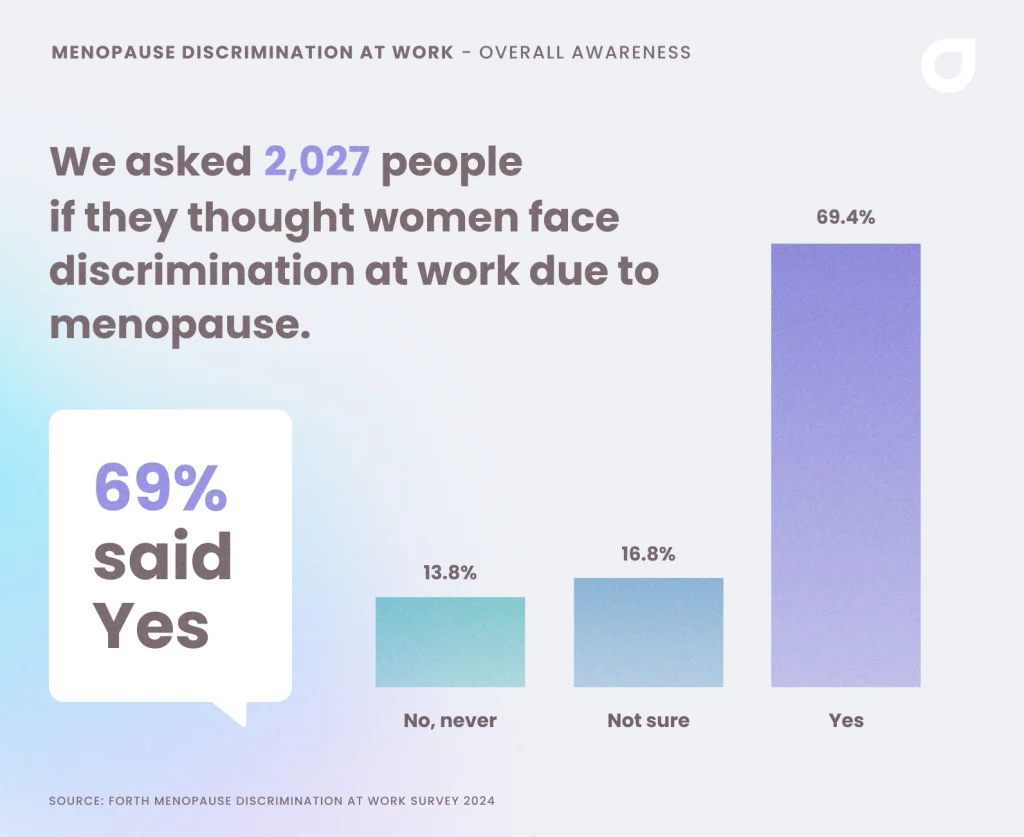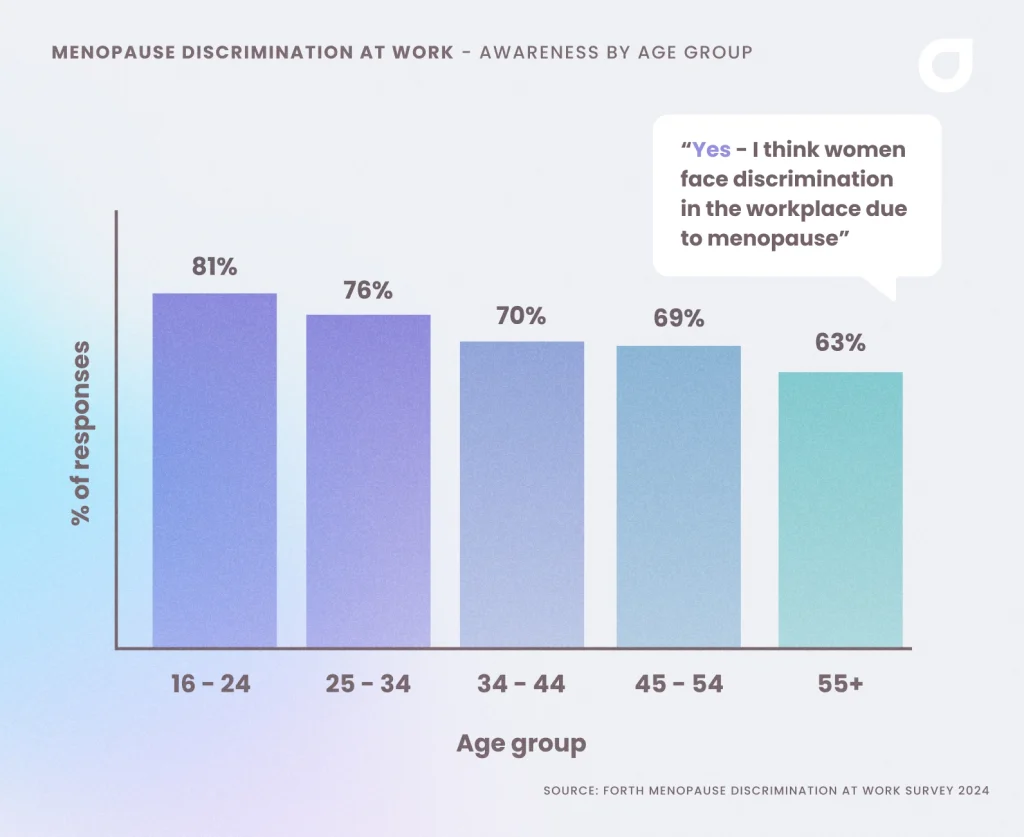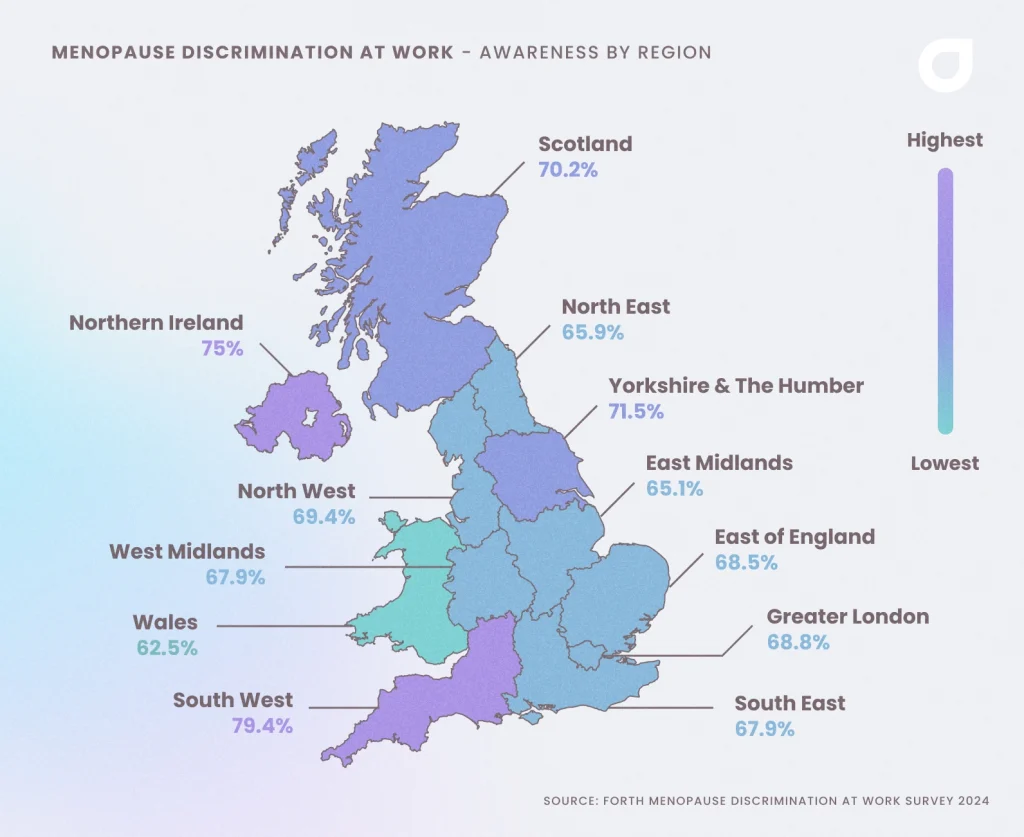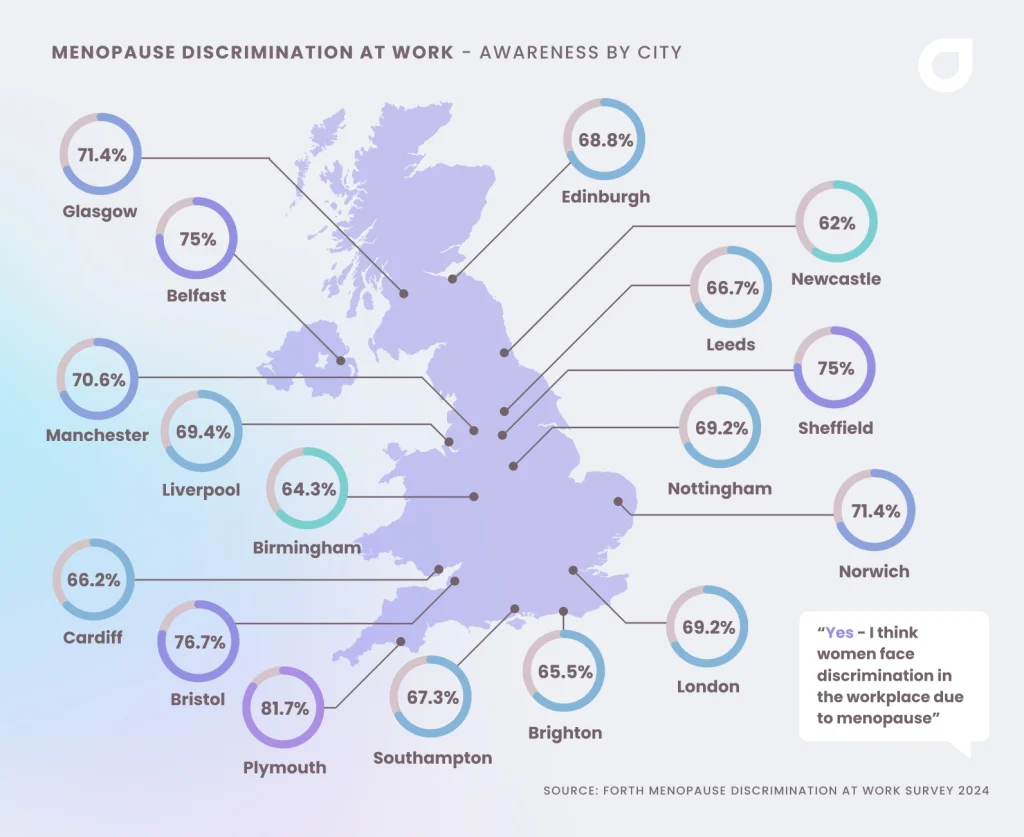11 mins read
Menopause Discrimination at Work: 2024 Statistics

- Do you think women face discrimination in the workplace due to menopause?
- Responses by Region
- Responses by City
In our recent menopause study we found that 63% of menopausal women said their work life had been negatively affected by menopause and 90% of workplaces have no formal support for women going through perimenopause and menopause.
To dig deeper we surveyed over 2,000 women and men in the UK on discrimination in the workplace, specifically around menopause. We wanted to understand if discrimination due to menopause was common.
Do you think women face discrimination in the workplace due to menopause?
We asked 2,027 people if they thought women face discrimination at work due to menopause.
69% responded ‘Yes’.
That means more than two-thirds of the people we surveyed think women face some form of discrimination or bias at work due to menopause or perimenopause. There are over 30 symptoms of perimenopause, with many of them impacting everyday life for women, both physically and mentally.
We also surveyed over 7,000 women in 2023 on their perimenopause symptoms and found the most commonly reported symptoms were mood changes, poor sleep and digestive issues.

Breaking this down by gender, 74% of women and 64% of men said ‘Yes’. A higher result for women is to be expected, as women are directly experiencing discrimination and are likely to be more aware of the impact of menopause on women at work.
Let’s look at the responses in more detail:
| All | Male | Female | |
|---|---|---|---|
| No, never | 13.8% | 17.7% | 10.2% |
| Yes, on rare occasions | 11.6% | 13.4% | 10.0% |
| Yes, sometimes | 44.2% | 37.7% | 50.2% |
| Yes, all the time | 13.6% | 13.4% | 13.8% |
| Not sure | 16.8% | 18.0% | 15.8% |
Only 13.8% of people believe women never face discrimination in the workplace due to menopause, and 16.8% aren’t sure.
“Sadly, this is fairly typical of where we are with menopause in the workplace. We have seen some positive steps to reduce bias from organisations who offer menopause awareness training and/or specific menopause support. Yet, there is much work to be done to increase overall awareness and reduce the impact of menopause symptoms at work. In 2023 we saw employment tribunal cases start to hit the media. The case of Maria Rooney and that of Karen Farquharson brought home just how much of an issue managing menopause at work is, and how far we have to go to reduce this bias and enable women to truly thrive during their menopausal years.”
Dr Beverley Taylor, Forth’s Menopause Expert
“While the heightened awareness of menopause discrimination is a positive aspect, the reality that women at this stage of life continue to experience such bias means we have much more work to do as a society.”
Sarah Bolt, Forth’s Founder and CEO
Responses by Age
Those aged 16-24 were most likely to think women faced discrimination due to menopause, despite being the age group least likely to know about or understand menopause. This might be because they have access to more information due to social media, or because family members, such as their mothers, may be going through menopause.
Surprisingly, the 35-44 age group were most likely to think women never faced discrimination or bias at work due to menopause.
Perimenopause is the phase leading up to menopause when periods start to become irregular. It can start in a woman’s 30s, but more often starts in their early 40s. This makes this data surprising because we expected people in this age group to be more aware of perimenopause and menopause than the younger groups.
| 16-24 | 25-34 | 34-44 | 45-54 | 55+ | |
|---|---|---|---|---|---|
| No, never | 10.3% | 13.5% | 16.0% | 11.2% | 15.3% |
| Yes, on rare occasions | 14.2% | 10.6% | 14.5% | 10.6% | 10.5% |
| Yes, sometimes | 47.4% | 44.6% | 38.0% | 46.5% | 44.5% |
| Yes, all the time | 19.4% | 20.2% | 17.3% | 11.5% | 8.1% |
| Not sure | 8.7% | 11.1% | 14.2% | 20.2% | 21.0% |
Overall, all age groups thought women did experience some form of unfair treatment at work due to menopause. Here’s a breakdown of the ‘Yes’ responses by age group:
- 16-24: 81%
- 25-34: 76%
- 34-44: 70%
- 45-54: 69%
- 55+: 63%

“The awareness among the 35-44 age group is surprising but just highlights how little this age group knows about this stage of life, and how important it is that educational campaigns target, not only younger groups, but those of menopausal age.”
Dr Beverley Taylor, Forth’s Menopause Expert
“It’s really positive to see the awareness of menopause amongst younger audiences when a generation ago this wasn’t being discussed.”
Sarah Bolt, Forth’s Founder and CEO
Responses by Region
Those in the South West of England were most likely to believe women faced menopause-related discrimination at work – 79.4%. We also broke the data down by city, and Plymouth was the city where people were most likely to respond ‘Yes’, too.
Northern Ireland closely followed the South West, with three quarters (75%) responding with ‘Yes’ to the question ‘Do you think women face discrimination in the workplace due to menopause?’. It also had the lowest percentage of people who thought women never faced any discrimination, with just 5.4% of people.

Wales had the lowest percentage of ‘Yes’ responses (62.5%) and the second highest percentage of ‘not sure’ responses (21.9%).
19.5% of people we surveyed from the North East of England thought women never faced any discrimination at work due to menopause, the highest percentage of all the regions. The West Midlands was just behind with 19%.
Here is the full list of regions and the responses:
| East of England | Greater London | East Midlands | West Midlands | North East | North West | Northern Ireland | Scotland | South East | South West | Wales | Yorkshire and the Humber | |
|---|---|---|---|---|---|---|---|---|---|---|---|---|
| Yes | 68.5% | 68.8% | 65.1% | 67.9% | 65.9% | 69.4% | 75.0% | 70.2% | 67.9% | 79.4% | 62.5% | 71.5% |
| No, never | 10.5% | 17.3% | 11.8% | 19.0% | 19.5% | 14.0% | 5.4% | 11.9% | 13.2% | 9.1% | 15.6% | 14.5% |
| Not sure | 21.0% | 13.9% | 23.0% | 13.0% | 14.6% | 16.7% | 19.6% | 17.9% | 18.9% | 11.4% | 21.9% | 13.9% |
Responses by City
When it comes to looking at the responses by city and region, we can see that there’s a generally high rate of people reporting discrimination towards women at work due to perimenopause and menopause, with the lowest being Newcastle (62%) and the highest being Plymouth (81.7%).
Belfast, Norwich and Glasgow had the lowest percentage of ‘No, never’ responses, with 5.4%, 6% and 8.6% respectively.
Here is the full breakdown by city:
| City | Yes | No, never | Not sure |
|---|---|---|---|
| Belfast | 75% | 5.4% | 19.6% |
| Birmingham | 64.3% | 20.1% | 15.6% |
| Brighton | 65.5% | 18.2% | 16.4% |
| Bristol | 76.7% | 11.1% | 12.2% |
| Cardiff | 66.2% | 11.3% | 22.5% |
| Edinburgh | 68.8% | 17.2% | 14.1% |
| Glasgow | 71.4% | 8.6% | 20% |
| Leeds | 66.7% | 17.5% | 15.8% |
| Liverpool | 69.4% | 16.7% | 13.9% |
| London | 69.2% | 14.8% | 16% |
| Manchester | 70.6% | 13.9% | 15.5% |
| Newcastle | 62% | 19% | 19% |
| Norwich | 71.4% | 6% | 22.6% |
| Nottingham | 69.2% | 9.3% | 21.5% |
| Plymouth | 81.7% | 6.7% | 11.7% |
| Sheffield | 75.4% | 11.5% | 13.1% |
| Southampton | 67.3% | 12.2% | 20.4% |

What discrimination do menopausal women face?
We wanted to look beyond the data and ask our customers about their experiences.
We asked them to explain what specific biases they thought women faced or what they had experienced as a consequence of menopause.
The main topic was being passed up for promotions.
“Promotions, access to opportunities, lack of sponsorship and support to progress, negative assumptions about behaviour and ability. Stereotyping, e.g. you’re the woman you’ll put the kettle on, take notes in meetings.”
“Definitely promotions.”
“Overlooked for promotion against a similarly qualified male. Unequal pay in a like4like role.”
“Less likely to get promotions.”
Another common topic was the symptoms women experience needing to be taken more seriously by their line managers and colleagues.
“Being branded ‘hormonal’, ’emotional’ and therefore not being able to progress or be taken seriously.”
“Some women suffer significant symptoms during the menopause and yet they are required to continue to work under conditions that men wouldn’t. Because it’s supposed to be “normal” rather than an illness where it would be acceptable to take time off work.”
“Being scrutinised for taking sick leave.”
“I believe it’s highly likely that due to the potential symptom consequences of menopause, it’s likely that some women experience subconscious discrimination or bias, most likely grounded in a lack of understanding around how the symptoms can affect the person experiencing them (ie struggling to focus, memory, emotional fluctuations etc).”
However, the bias isn’t just felt by menopausal women. One respondent highlighted that periods are also a challenge for women to navigate at work, with it even being used in negative contexts.
“I have witnessed female colleagues not being taken seriously when they are menstruating, as though they are exaggerating or using it as an excuse. I have also witnessed misogyny in this context ….’what’s wrong with her? She’s on her period’ …..whenever a woman has an opinion.”
This highlights that businesses have a lot of work to do to support women of all ages, particularly women going through the difficult transition to menopause.
Does more need to be done?
Our research has found most people believe women face discrimination at work when going through menopause. The symptoms of perimenopause can affect women both physically and mentally, which can make everyday tasks harder than usual.
Symptoms like hot flushes, insomnia, brain fog, anxiety, loss of confidence and mood swings are typical symptoms of perimenopause that can make working life difficult.
Imagine having a hot flush during an important meeting and losing your train of thought, or suddenly forgetting your colleagues names when needing to introduce them, or losing confidence and second-guessing yourself, re-reading emails over and over in case you missed something – all these things and many more are very comment during the menopause transition, a transition which can go on for years.
Supporting your partner, friends, colleagues and employees going through these symptoms is important, no more than that, it’s imperative to our working environments. Especially as menopausal women are the fastest demographic in the workplace, yet also more likely to leave work prematurely during menopause due to difficulties managing symptoms at work.
In 2019 we surveyed 1,000 women, looking at how perimenopause and menopause affected their work life. We found that 24% of women had called in sick due to symptoms of perimenopause at least once. Businesses need to ensure they create an environment that supports women through all stages of their lives – including support around menstrual cycles, maternity leave and menopause.
Creating a supportive work environment
But it isn’t all doom and gloom. We can reduce workplace discrimination and enable women to thrive during menopause if we focus on creating supportive working environments. This may mean different things depending on the size and needs of an organisation.
Anything from having an open culture where it is acceptable to talk about menopause and its impact at work, to having a specific menopause policy or providing specific adjustments to working conditions.
Having a supportive culture will not only reduce workplace discrimination and support women to stay in work, but it also helps to free up mental energy for work, meaning we can be more productive!
We can create supportive work environments by:
- Reviewing our hiring processes to remove discrimination against women going through menopause (screening CVs, removing age/gender etc to remove unconscious bias).
- Developing supportive, no-blame work cultures
- Developing a specific menopause policy
- Providing menopause awareness training for all line managers and staff
- Making reasonable adjustments or changes to working conditions to support menopause i.e. fans on desks and meeting rooms, temperature-controlled rooms, offering flexible working, having good toilet facilities, having rest areas at work etc.
- Ensuring menopause support is included in our employee benefits programmes
New Guidance for 2024
New guidance was released by the Equality and Human Rights Commission in February 2024. The new guidance protects menopausal women under the Equality Act 2010, which protects employees against discrimination, harassment and victimisation based on characteristics such as disability, age and sex.
Going forward, businesses will find themselves in hot water if they aren’t supporting women dealing with the symptoms of menopause while at work by making ‘reasonable adjustments’.
The exact wording of the guidance is:
If menopause symptoms have a long-term and substantial impact on a woman’s ability to carry out normal day-to-day activities, these symptoms could be considered a disability. If menopause symptoms amount to a disability, an employer will be under a legal obligation to make reasonable adjustments. They will also be under a legal obligation to not directly or indirectly discriminate because of the disability or subject the woman to discrimination arising from disability.
Women experiencing menopause symptoms may also be protected from direct and indirect discrimination, as well as harassment and victimisation, on the grounds of age and sex.
Under health and safety legislation, employers also have a legal obligation to conduct an assessment of their workplace risks.
Tips on managing menopause symptoms
Menopause is an often complex and confusing time. We can experience many different symptoms and our relationship with our body can change as often as our symptoms do! We can support ourselves by:
- Eating a healthy diet
- Reducing sugary snacks, alcohol, caffeine and processed foods
- Focusing on regular exercise and including strength training in our exercise regime
- Developing good sleep routines
- Increasing our self-care to support our mental health
Read more in our blog Living with Perimenopause
You may also be interested to understand more about specific medical treatments for menopause, like hormone replacement therapy (HRT). As we go through menopause, our levels of oestrogen and progesterone drop and HRT works by replacing these hormones. It can be used to treat symptoms like hot flushes, night sweats, sleep problems, mood swings
anxiety and low mood and is also an effective preventative treatment for symptoms like cardiovascular disease and osteoporosis. Read more about HRT in our blog What is HRT?
If you think you may be entering perimenopause, we have a free perimenopause symptom quiz. We also have the UK’s only home blood test that can screen for perimenopause. You collect a small blood sample on day 14 and day 21 of your menstrual cycle. We use groundbreaking AI along with your blood samples to map your hormone changes across the entire cycle.
Unlike single-day blood tests found in supermarkets, our perimenopause blood test gives accurate and actionable insights into your female hormones, helping you take the next steps to feeling yourself again.
- Health scores calculated
Close
This information has been medically written by Dr Beverley Taylor
Bev has been a Chartered Psychologist for over 10 years, obtaining a Doctorate in Health Psychology in 2010. She has worked as an academic researcher and research consultant before focusing on how she can support those with menopause via lifestyle, education, and one-to-one support. Bev regularly writes about psychology, menopause, and behavioural change and has attended numerous events as both a speaker and a panellist.

Dr Beverley Taylor
Menopause Expert
Related articles
Like this article? Here are some more based on similar topics.





